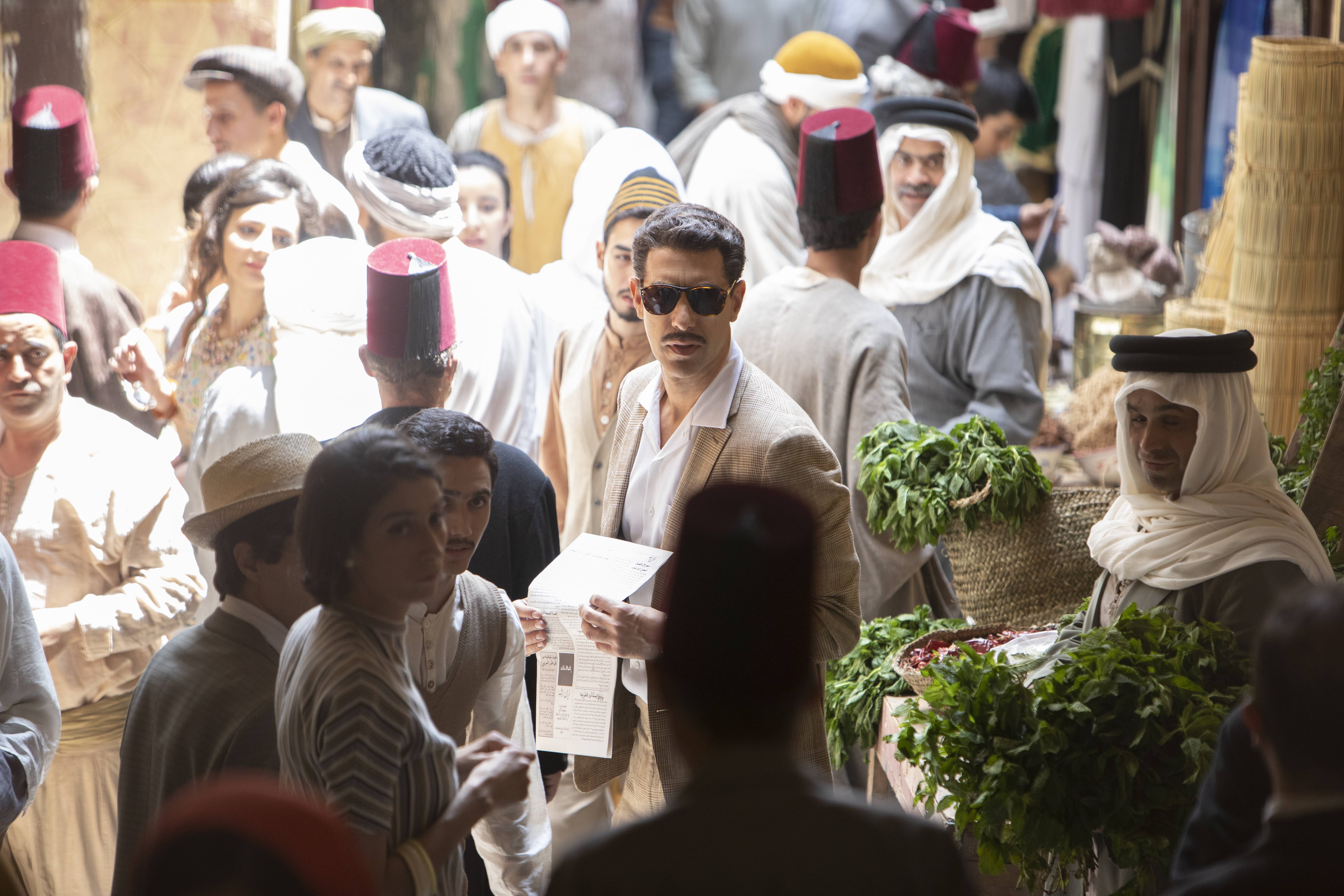 “The Spy” Photo courtesy of Netflix
“The Spy” Photo courtesy of Netflix Israeli writer-director Gideon Raff’s story about Israel’s secret mission to rescue Ethiopian refugees in “The Red Sea Diving Resort” recently premiered on Netflix. He returns to the streaming service with another secret mission story from Israel’s past with “The Spy,” a six-part miniseries starring Sacha Baron Cohen in the title role of Mossad agent and national hero Eli Cohen.
Following Cohen on undercover missions in Syria in the early 1960s, where he managed to infiltrate the highest levels of government, the drama has many heart-stopping scenes in which Cohen narrowly escapes detection. But the series is also about what spying does to the psyche and the repercussions of living a double life.
“In telling another spy story, I was looking to do something different this time: to convey the human aspect of being a spy, what it does to your personality, your character, to be torn between your disguise and your real person,” Raff told the Journal. “You have to almost be a method actor. You have to really embrace the undercover identity, but when you come back home, you have to strip it away. I wanted to explore the aspect of identity and, for Eli, the tug and pull between patriotic duty and his family.”
Like every Israeli, Jerusalem-born Raff (“Prisoners of War,” “Homeland”) grew up learning about Cohen’s heroism in school. “We knew the highlights of the story, what he achieved but not the details of how he achieved it and how big his sacrifice was,” he said. Finding out involved extensive research, meeting with Cohen’s wife and children, and talking to ex-Mossad agents who were working at the time, but not directly with Cohen. There was a lot of story to tell, which is why it’s a miniseries, not a movie.
Raff wrote the script with Baron Cohen in mind, and flew to London to meet with him. The British-born actor and double Emmy nominee for “Who Is America?” grew up with the Eli Cohen story, too. “He’s very connected to Israel. His mother is Israeli. He understands the culture. He speaks Hebrew. But this is a bit outside of what Sacha usually does,” Raff said. “He was so courageous to take this on.”
“This story isn’t about how it ends, whether Eli will be caught or not. It’s about how he rose so high in Syria, what made him tick, and the price he had to pay and all the people around him had to pay.” — Gideon Raff
Most of “The Spy” was shot on locations all over Morocco including Casablanca, for its visual verisimilitude to Damascus and Tel Aviv. Budapest stood in for Zurich, Paris and Buenos Aires. While there, Raff and his husband, Udi Peleg, visited the Tree of Life memorial, a sculpture adjacent to the Dohány Street Synagogue. It’s inscribed with the names of Hungarian Holocaust victims, including those of Peleg’s grandfather and great-grandfather.
Raff acknowledged the challenges that come with making a period piece, but credited his international cast and production team with keeping things accurate. He purposely chose to tell the story in a nonlinear fashion, beginning the first episode with a foreshadowing of the ending. “This story isn’t about how it ends, whether Eli will be caught or not,” Raff said. “It’s about how he rose so high in Syria, what made him tick, and the price he had to pay and all the people around him had to pay.”

Cohen’s relationships with his Mossad handler Dan Peleg (Noah Emmerich) and his wife, Nadia (Hadar Ratzon Rotem) are at the heart of the story. “Dan is sending this man he has grown to love to a very dangerous place. He has this dilemma: He wants to protect him, but by sending Eli in, he’s protecting many other people,” Raff said. “Nadia senses more and more that [Eli] is changing and putting himself in danger. But she loves him and she doesn’t want to stand in the way of his duty and self-fulfillment. So a lot of the suspense comes from the personal drama, not whether Cohen is going to jump off a cliff or shoot a guy. You care about these people, and that’s what keeps you on the edge of your seat.”
Beyond the personal story, “The Spy” is a slice of history covering a seldom-portrayed period that significantly impacted the conflicts that followed. The intelligence that Cohen provided enabled Israel to defeat the Syrians in the Six-Day War. “It’s a story about how the Middle East came to be what it is today,” Raff said.
But 55 years after his death, Cohen’s story isn’t over. The Syrians refused to return his remains to Israel, and Nadia still campaigns for their return. “With everything happening in Syria right now, who knows?” Raff said. “But I can only hope that the family has some closure and gets his body back.” In any case, Cohen’s name lives on all over Israel, where numerous streets and schools are named for him.
Having gone straight from editing “The Red Sea Diving Resort” to shooting “The Spy,” Raff is welcoming the break. “I have nothing coming out soon so I’m going to dive back into my little cave and start writing,” he said. He hopes that audiences will watch and realize the price paid by people like Cohen and the ones they left behind. “We put these heroes on pedestals but for their families, the sacrifices they made endure. The pain continues,” Raff said. “Stories like these investigate the people behind that iconic stature — the lives they led and the price they paid.”
“The Spy” begins streaming Sept. 6 on Netflix.






















 More news and opinions than at a Shabbat dinner, right in your inbox.
More news and opinions than at a Shabbat dinner, right in your inbox.